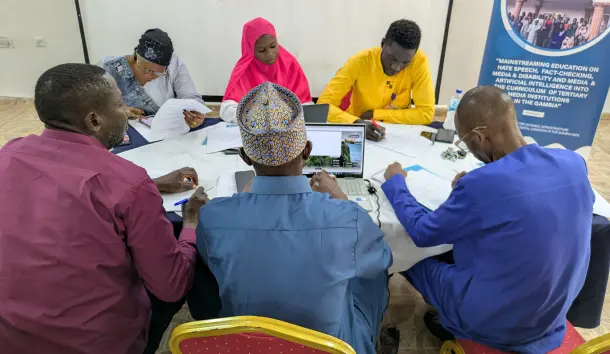Banjul, The Gambia — The University of The Gambia (UTG), with technical support from UNESCO, has commenced a landmark initiative to integrate critical subjects such as hate speech, fact-checking, media and disability, and media and artificial intelligence into the curriculum of tertiary media institutions across the country.
The initiative forms part of the UN Peacebuilding Fund-supported project titled “Strengthening the National Infrastructure for Peace to Promote Social Cohesion in The Gambia.” The three-year project is jointly implemented by UNESCO, UNDP, and the International Trade Centre (ITC), in close collaboration with the Government of The Gambia, civil society actors, and youth groups.
Aligned with the United Nations’ Strategic Action Plan on Hate Speech, the curriculum aims to tackle information disorders, including hate speech and disinformation, as part of a broader effort to enhance peacebuilding mechanisms and foster national social cohesion.
Speaking on the importance of the initiative, Professor Melchizedek Onobe, Dean of the UTG School of Journalism and Digital Media, emphasized the need to empower students with skills to safeguard information integrity.
“I believe that this curriculum has the potential to make a significant impact on promoting peace and social cohesion in The Gambia,” Professor Onobe said. “It is designed to help learners develop creative skills to effectively address issues of information integrity.”
Representing the UN Resident Coordinator, Ms. Golda Keng, Peacebuilding Fund Coordinator in The Gambia, highlighted the transformative potential of the new curriculum for future media professionals.
“This is not just about training journalists,” she noted. “It is about equipping them with the tools to report responsibly, uphold ethical standards, and contribute to a society that values truth, dialogue, and peaceful coexistence.”
Also speaking on behalf of the UN Resident Coordinator, Lamin Jarjou, senior program officer at UNESCO NATCOM (Gambia), underscored the urgent need to adapt media education to the rapidly evolving global landscape.
“Mainstreaming education on these critical issues is not only essential for the media industry but also for the sustainable development of our society,” Mr. Jarjou said. “We must ensure that the next generation of media practitioners is equipped to navigate the complexities of the modern information environment.”
The draft curriculum is currently undergoing validation through consultations with media industry players and curriculum development experts. Once finalized, it will provide learners with the competencies needed to:
Identify and counter hate speech, cultivate critical thinking and fact-checking capabilities to address misinformation and disinformation, promote inclusive and accessible media practices that uphold the rights of people with disabilities, and examine the emerging opportunities and challenges posed by artificial intelligence in journalism.
The initiative represents a strategic step in fortifying The Gambia’s media education sector and, by extension, its democratic and peacebuilding processes.










